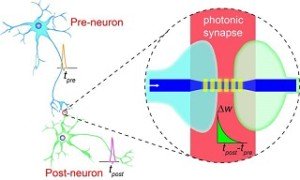
How are cyber-brain searches?
There is a lot of research mapping the brains, and investigating aspects of how certain  functions work such as: motor function, vision, and in a very special way the
functions work such as: motor function, vision, and in a very special way the
Cognitive Neuroscience studies the cognitive ability (knowledge) of a person, such as reasoning, memory and learning.
A recent study by the Universities of Exeter and Oxford of the United Kingdom, in conjunction with the University of Munster in Germany, has developed photonic microchips that immitate the synapses of the human brain using light and no longer electricity, as in other chips.
The chips is manufactured using the frequency phenomenon, but from the combined phase shift in the integrated photonic circuits designed for this, with synapses can operate at 1,000 times the speed of humans, which does not mean they do the same.
The researchers say that it is a fundamental step in machines capable of functioning and in the way of thinking in a way similar to the brain since the photon is fast and low energy consumption.
David Wright told the University of Exeter website that the project addresses two important issues in electronic computing, both speed and efficiency and capacity problems in parallel processing, the fastest of now: ” not only by developing…new brain-like computer architectures, but also by working in the optical domain to leverage the huge speed and power advantages of the upcoming silicon photonics revolution “
On-chip photonic synapse by Zengguang Cheng, Carlos Rios, Wolfram Pernice, C David Wright and Harish Bhaskaran is published in Science Advances.









